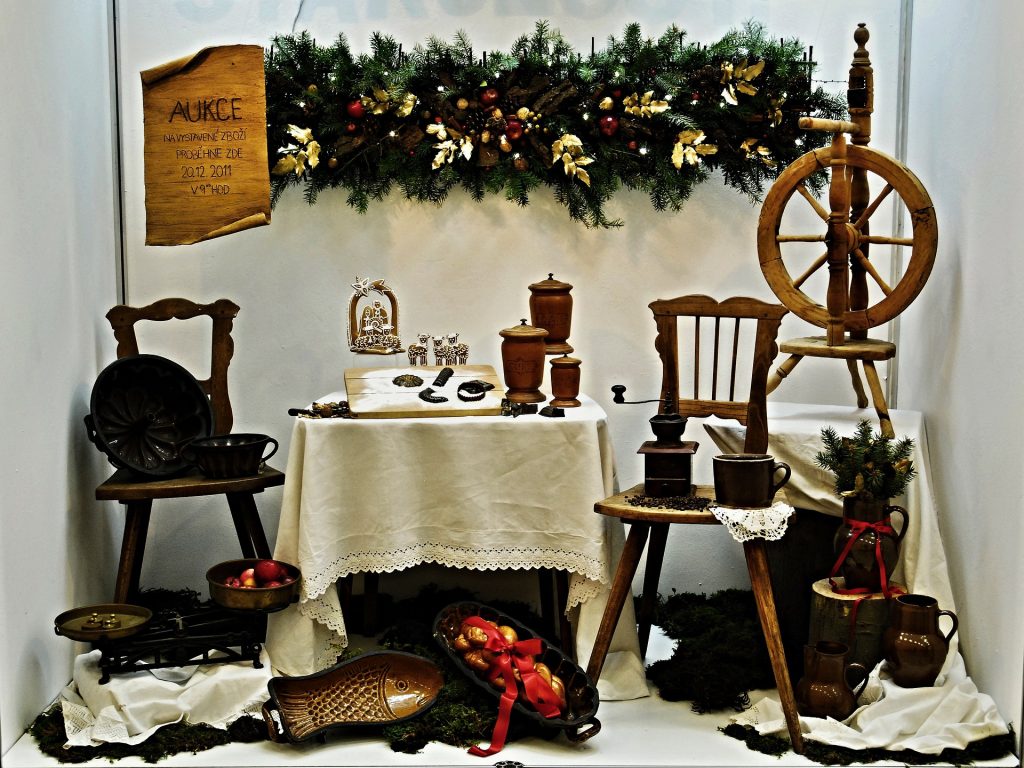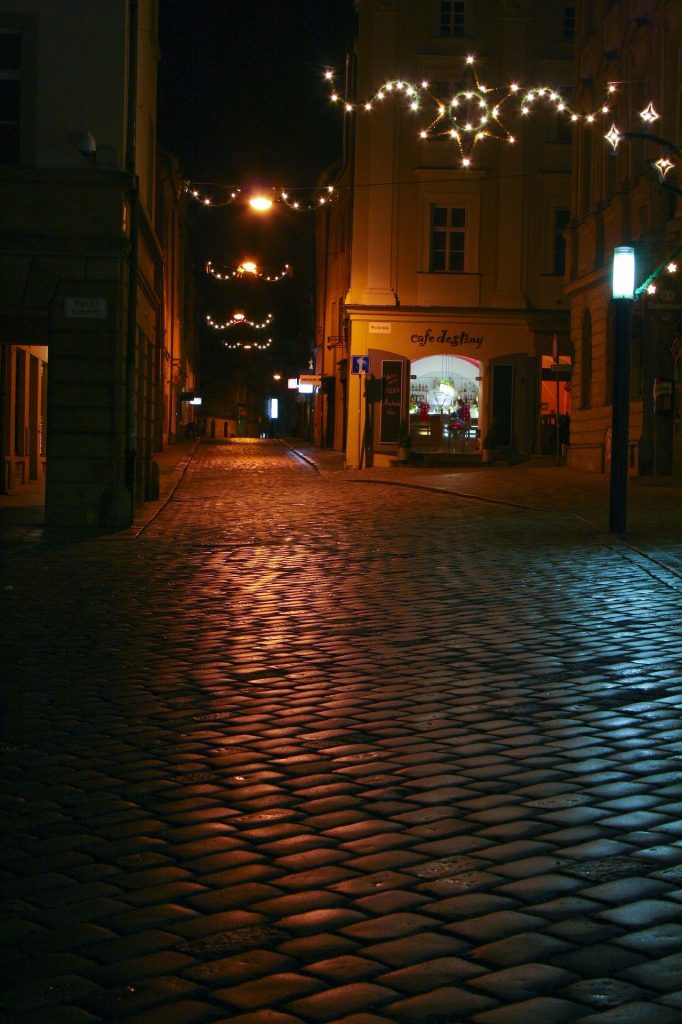This post was written by Dr James Partridge, Teaching Fellow in Czech (with Slovak) at Oxford. Here, James tells us about Christmas in the Czech Republic.
My first Christmas in the Czech Republic was back in 1993, when I was still an undergraduate, 3 months into my year abroad in Brno. Christmas customs, though, are usually measured in decades and centuries, so 25 years later my Czech students at Oxford on their years abroad will still see most of the same things I did.
Much of the run up to Christmas (Vánoce) will be familiar to anyone from the UK: packed shops, panic buying, mildly disappointing Christmas markets. Early in December, though, the first Czech Christmas ritual begins: the baking of cukroví – Christmas biscuits. There are many different kinds of cukroví, and most are usually quick and easy to make, but they are made in large quantities. Most families take great pride in baking their own cukroví and have their own favourite recipes, often handed down through the generations. Vanilkové rohličky (vanilla rolls) are made from a simple dough of butter, flour, sugar, egg yolk, a little vanilla sugar, perhaps some ground nuts, pressed into moulds and baked quickly. Medvědí tlapičky (‘bears’ paws’) are made from a similar dough, but flavoured with cocoa. Colourfully decorated gingerbreads are also very popular, and some cukroví such as kokosové kuličky (coconut balls) aren’t baked at all. However you make them, the idea is to make as many as possible so that there will always be a selection available for family and guests for the whole Christmas period, if they last that long.

Christmas day itself (Štědrý den, literally ‘Generous / Bountiful day’) is on December 24th. In the past, Štědrý den was a day of fast and people would eat nothing (or very little) until the evening. In the middle ages, the custom was not to eat meat during the day, but something plain like barley groats with mushrooms. Those who honoured this custom faithfully were rewarded by seeing a vision of a zlaté prasátko (golden pig) in the early evening. Traditionally, the pig is a symbol of abundance and prosperity, and gold represented the passing of the winter solstice, however people nowadays usually just tell their children that you see the golden pig because you are so hungry by sunset that you start hallucinating.
Once you’ve seen the golden pig it’s time to sit down to Christmas dinner and eat until you can eat no more, and the centrepiece of the meal should always be carp. The Czech tradition of eating carp is a very old one, probably dating back a thousand years or more to the early Christian period, when monasteries would construct special fish-ponds for raising carp to eat. The cultivation of carp really took off in southern Bohemia after the early 15th century on the estates of the powerful Rožmberk family, and especially thanks to the work of their celebrated Master of Fisheries Jakub Krčín (1535-1604), who oversaw the building of a network of lakes that still supply carp to this day.
Buying carp before Christmas is a task that many westerners find… disturbing. A week or two before Štědrý den, large blue plastic vats overflowing with water begin to appear outside supermarkets, on street corners and in other places in villages, towns and cities across the country, and these vats are filled with carp, brought up from the lakes of Southern Bohemia. These are big fish: 5-8 kg is a pretty standard size. Long queues form, regardless of freezing winds and snow, and people simply choose their carp from the small shoal swimming around in front of them. Up until quite recently, many families would take their live carp home with them and put it in the bathtub for a few days as a sort of ‘pet’, albeit one whose remaining days were very short in number. Nowadays, the fishmongers who run the carp stalls usually just hoik the animal out of the water, whack it on the head with a hammer and then either wrap it up and give it to the customer (hopefully not still flapping), or behead and gut it on the spot. Once they get going, it doesn’t take long before the pavement is running red with fish blood.
The fish itself is prepared by being filleted, breaded and fried until golden brown, and it is always served with remarkable quantities of potato salad. This may sound easy, but filleting a big carp is serious manual labour, and nothing can go to waste: fish giblet soup is one of the highlights of the whole meal.

The other essential component to any Czech Christmas is watching pohádky, which are filmed versions of classic fairy tales. This is a tradition that really took off in the early years of the communist period, and one of the first pohádky is still one of the most loved: Císařův pekař a pekařův císař (The Emperor’s Baker and the Baker’s Emperor, 1951), written by and starring Jan Werich – an actor and writer of great importance in Czech theatre and film history. I should also mention Pyšná princezna (The Proud Princess, 1952), Princezna se zlatou hvězdou (The Princess with the Golden Star, 1959), the extraordinary, expressionist (and genuinely scary) Tři zlaté vlasy Děda Vševěda (The Three Golden Hairs of Grandpa Knowall, 1963), not forgetting the delightful and hugely popular Tři oříšky pro Popelku (Three Hazelnuts for Cinderella, 1973). And no Christmas would be complete without the Russian fairy tale Mrazík (Old Father Frost, 1967). I first saw it in the cinema during that first Christmas in Brno in 1993 and the atmosphere was like a late-night showing of The Rocky Horror Show here in England: the audience knew every word of the story of Ivanko and the lovely Nastěnka, and sang along to the soundtrack of the film.
These classic pohádky are an integral part of the Czech Christmas ritual. The TV papers are eagerly scanned to see when Tři oříšky or Pyšná princezna are showing, and on that basis lunch, supper, or visits to and from friends and family are carefully arranged. More surprisingly still for the uninitiated foreigner, the same films are watched religiously every year and enjoyed just as much as they were in previous years. Pohádky, in short, are as much a part of Christmas as cukroví and carp.
Adventures on the Bookshelf will be taking a break now for Christmas but we’ll be back on 9th January. Have a great festive period and Merry Christmas – or, as they say in Czech, ‘Veselé Vánoce!’



